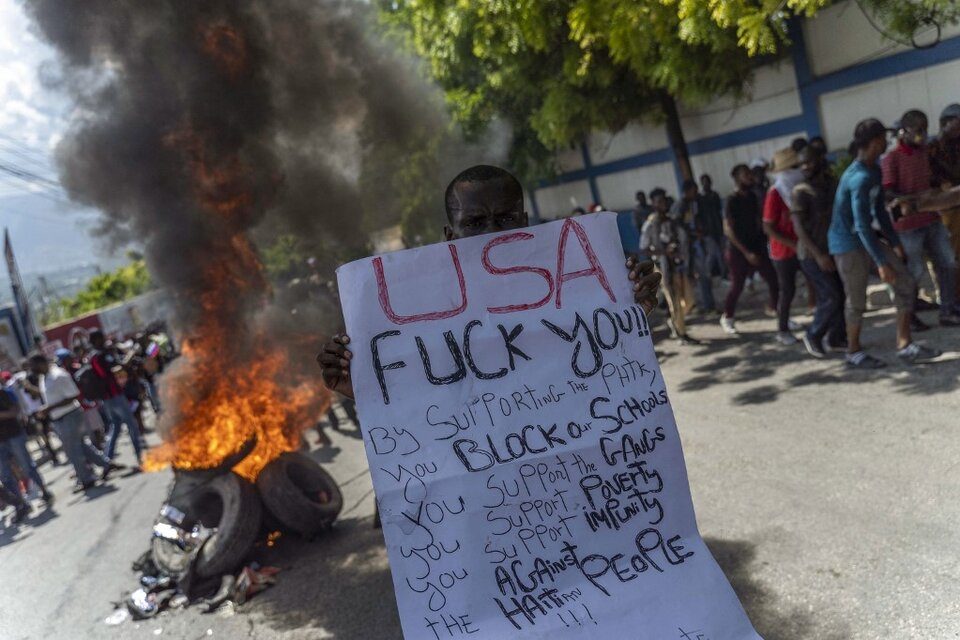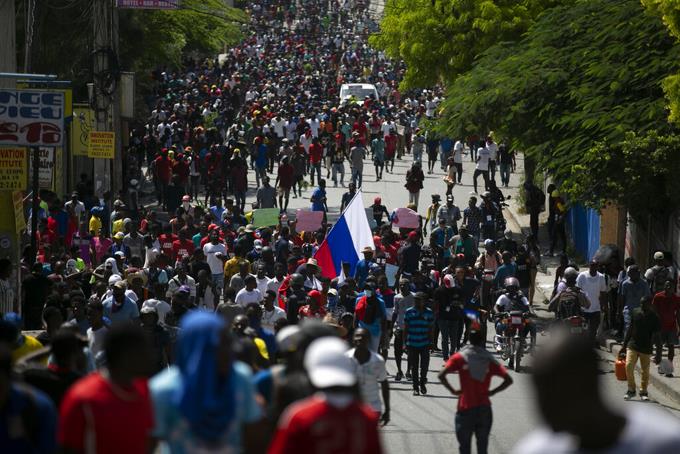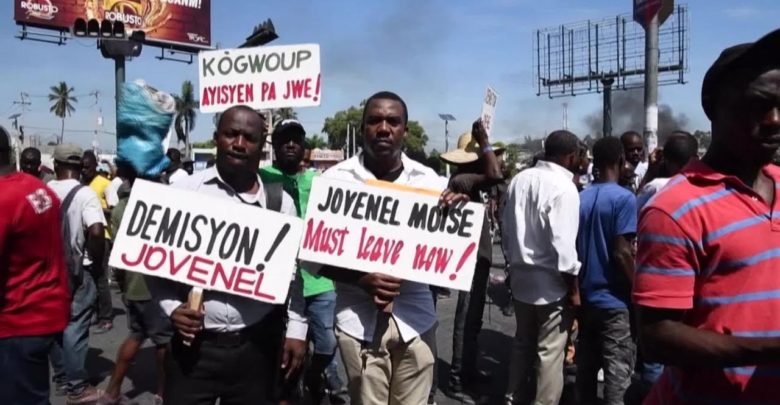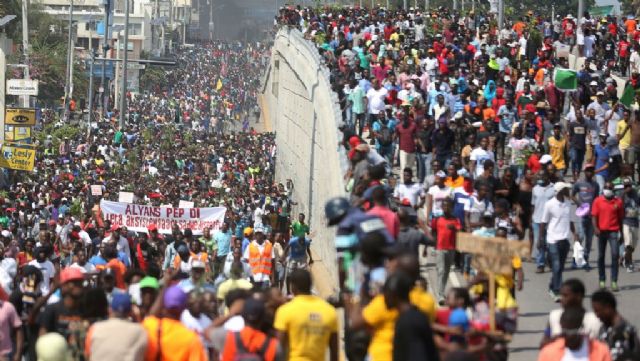América es, sin dudas, una zona roja del mundo, Haití en particular, un escenario de rebelión en curso que enfrenta la amenaza de una intervención imperialista al servicio de salvar a la casta gobernante y frenar la iniciativa de las masas. Crisis económica, disputas internacionales y perspectivas de una lucha abierta que requiere solidaridad revolucionaria activa y urgente.
Por Martín Carcione
Haití se encuentra en un proceso muy álgido de la lucha de clases, los últimos meses transcurrieron entre el asesinato del presidente Jovenel Moise, masacrado en la residencia presidencial, y la irrupción de una verdadera rebelión popular ante las medidas de ajuste impuestas por su sucesor Ariel Henry, siguiendo los dictados de los organismo internacionales.
Si bien en el país el escenario asume contrastes violentos por sus propias particularidades, no deja de representar el plan global continental que puede verse en los distintos países de la región: inflación, carestía de la vida, recortes presupuestarios y todo esto al servició de garantizar la supervivencia de un puñado de parásitos empresarios ligados al capital transnacional. Sobre esta realidad, en agosto del 2021 un terrible terremoto aumentó al extremo el desastre.
Lejos de modificar los planes de las elites, el gobierno, con un claro alineamiento a EEUU y las potencias de la OTAN continuó con las medidas de ajuste provocando una respuesta masiva y un estallido que acumula semanas de desarrollo y no vislumbra un devenir claro.



Crisis migratoria, enfrentamientos y la encrucijada de nuevas intervenciones
Miles de haitianas y haitianos han intentado huir en los últimos meses, encontrando la verdadera cara de la diplomacia imperialista, perseguidos en las fronteras de Estados Unidos y otros países de la región constituyen una verdadera masa de desposeídos que se despliegan a lo largo y ancho de la geografía americana. No es extraño, teniendo en cuenta que la última “respuesta” continental a la crisis aportada por “progresistas” y derechistas fue el envío de tropas de ocupación que generaron estragos.
Argentina, Brasil, Bolivia y otros Estados en aquellos años gobernados por Kirchner, Lula o Evo Morales no dudaron en acompañar esa perspectiva, mientras que hoy producen un rotundo silencio frente al nuevo intento de intervención imperialista que se encuentra en la agenda de la ONU y los EEUU solicitado por el propio gobierno haitiano acorralado por la movilización popular que, esta semana volvió a ocupar la capital, Puerto Príncipe y las principales ciudades.
Las últimas jornadas de protestas fueron disparadas por las alzas del combustible y la represión violenta de las mismas impulsó aún más la llama de una movilización que exige la caída del gobierno y se niega rotundamente a cualquier intervención yanky o de la ONU.
Esta misma semana, una nueva movilización masiva tomó las calles de Puerto Príncipe en el aniversario de la muerte del héroe de la independencia Jean-Jacques Dessalines, mostrando una vez más la combinación que se ha visto en otros procesos populares entre la reivindicación de los procesos de liberación nacional, reivindicando figuras como Dessalines que enfrentaron de manera revolucionaria la opresión colonial y generando una mixtura progresiva y potente entre las reivindicaciones antirracistas, anticoloniales y anticapitalistas, con una profunda base social.
Rechazan la intervención de los organismos internacionales, identificados claramente con los problemas y no con las soluciones y ponen en debate la necesidad de profundos cambios que van más allá de la institucionalidad actual.
La movilización no sólo enfrenta los embates de las fuerzas represivas formales enviadas por el gobierno sino la constitución y la acción de bandas paramilitares armadas y sostenidas por el mismo y sin embargo persiste, demostrando en gran medida otra característica de la situación internacional en su conjunto: la polarización que asume expresiones cada día más extremas y radicales.

Solidaridad internacional contra la intervención imperialista y al servicio del triunfo de la rebelión
Como todos los hechos agudos de la lucha de clases, la situación en Haití involucra fuerzas que exceden los límites de las fronteras nacionales. El pedido de injerencia imperialista directa impulsado por el gobierno tiene el claro objetivo de aplastar la iniciativa independiente de las masas. Al mismo tiempo, en el tablero internacional otros actores como China o Rusia, junto a sus aliados en la región, pretenden medir fuerzas y posiciones no al servicio de la movilización, sino a sus propios intereses.
Es por esto que es clave desarrollar una solidaridad internacional activa que parta de apoyar la rebelión del pueblo haitiano contra su gobierno y enfrentar cualquier tipo de intervención Yanky o de la ONU sin confiar en la diplomacia imperialista, generando acciones de movilización y apoyo internacional, repudiando cualquier envío de tropas e impulsando un particular apoyo a las organizaciones obreras y revolucionarias que actúan en el proceso.
Es importante en este sentido el conjunto de acciones que comienzan a prepararse desde las organizaciones populares en múltiples países desde México hasta el cono sur, estrechando lazos y buscando aunar esfuerzos en este sentido. Desde la Liga Internacional Socialista y todas nuestras secciones aportamos a estas tareas con la firmeza de que solo la unidad de las y los trabajadores, la juventud y los pueblos podrá generar un nuevo marco de unidad continental para enfrentar los planes de los gobiernos, el imperialismo y los organismos internacionales saqueadores.
¡No a la intervención imperialista en Haití!
¡Rechazo absoluto a cualquier envío de tropas!
¡Todo el apoyo a la rebelión del pueblo haitiano!
¡Defensa irrestricta de su derecho a la autodeterminación!
¡Abajo los planes del FMI y otros organismos multilaterales, en Haití y en todo el continente!
Por la coordinación internacional y la solidaridad activa al servicio de estas tareas.




